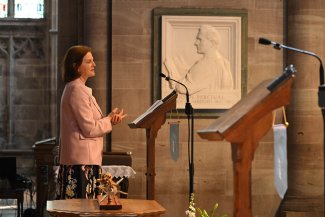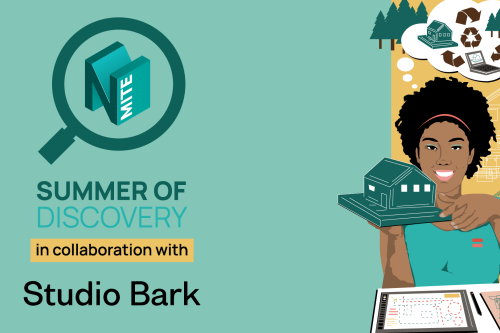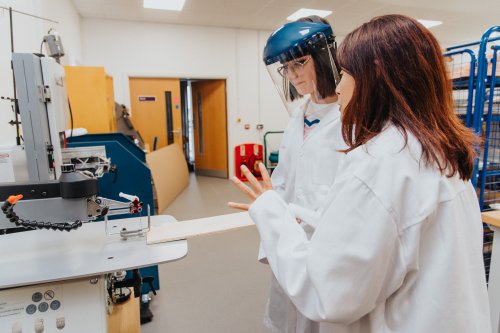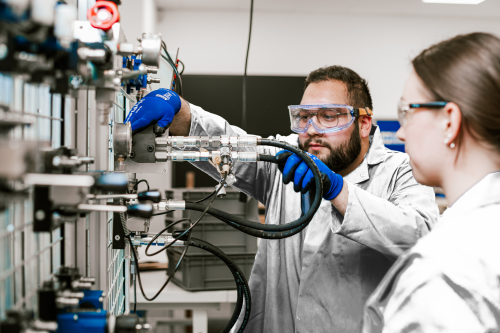Thank you for your kind introduction. It is an honour to be part of such a special day.
To all of you graduating today, I congratulate you on your amazing achievement. You have all worked extremely hard to get here and I have no doubt exciting careers lie ahead of you. Wherever you go, it will always be special to be part of the first cohort to graduate from NMITE and I hope you can find time to celebrate properly with friends and family.
To those of you who are here as guests of graduates, thank you for being here today and for the support through the graduates’ journeys. As a parent, I have found out that behind most successful graduates is a great support team! I hope you have a chance to celebrate too.
I think you now appreciate from what other speakers have said how important NMITE is to Hereford and to this area. And there have been many times in Hereford’s history when it has needed good engineers. Looking around this wonderful cathedral, it is hard to imagine the chaos that there must have been when the West Tower collapsed in 1786 taking with it most of the west front and part of the nave. Given where we are, I hope they had good engineers working on it when it was rebuilt!
When Thomas Telford was building bridges and canals up the A49 in Shropshire, he was apparently short of good engineers with just the practical skills NMITE encourages. And if NMITE had existed at the start of the 20th Century, maybe Charles Rolls (who came from down the road in Monmouth) would have started his business in Hereford, and RollsRoyce would have called Hereford, not Derby, home. What if! But NMITE is here now.
And for the future, if any of you would like to come back to help build the long-awaited bypass when it finally gets approved, I would certainly appreciate it!
NMITE has prepared you well for working life after graduation. It has introduced you to the language and processes of engineering, regardless of the field of engineering you choose to follow and the company or location you decide to work in. You now have the mental tool kit for a satisfying and interesting career. And your skills are highly sought after as your success at finding jobs has shown.
I know you have already heard several speakers today, and I don’t want to over-burden you with my advice. I feel something of a fraud being here too as I have to admit that I am not an engineer. But what I would like to do is share with you 3 things that I wish I had understood better when I graduated and started work.
The first is the power of curiosity.
I’m sure you have learnt already that things are more enjoyable and absorbing if you are interested. Curiosity can power you to learn new things, develop new skills and make new connections. When making career choices, pick things that really interest you and will keep you curious, and you will be more successful.
Engineering during the next decades will undoubtedly be re-shaped by AI and you will need to continue to learn new skills and adapt through your working lives. This may be a challenge but it can also be really exciting. And you will be much more motivated working on things that interest you and better able to adapt.
I read an interview recently with Demis Hassabis, CEO of Deepmind, and a recent winner of the Nobel prize for his contribution to the development of AI. Many see his work in the field of AI as transformational and he has a great life story. Demis is the son of immigrants to the UK. His dad was a toy salesman and his mother worked in a department store. He got his first job with a company developing computer games when he was 16 after winning a competition they had run. He had been home schooled and developed an interest in computers and at work, he proved to be an excellent coder.
However, he was really keen to learn more about computers and work out how to make computers “intelligent” like humans. His boss at the time gave him a cheque for £1 million to try to persuade him to stay with the gaming company, but he still left to go to university. For him, the power of curiosity pushed him to do something different and he knew money was not everything.
I love this story. It is a great illustration of the power of curiosity, which still seems to drive Hassabis ever onwards. And he is still only 48.
Through your degree, you have honed your curiosity and problem solving skills. From here, you will have many opportunities to push the boundaries of what engineers think is possible today and solve the problems of tomorrow. Stay curious.
My second learning is about making mistakes.
By definition, engineers make lots of mistakes. Not everything works, and complicated processes fail. This is part of the journey and mistakes are often the key to success; at the moment with our partners, BAE is developing a prototype for a next generation fighter jet, with the UK planning to fly a demonstrator in 2027. The development process is a long and challenging one, and ideas are constantly refined. Even the appearance is changing each year. The engineers working on the project know this will make a better jet in the end.
The key for me is to learn from your mistakes. Why didn’t something work? What would you do different next time? What can you take away from something that didn’t work so well? But don’t be obsessive about mistakes. I say to my children that regret is a useless emotion and I really believe that. Reflect honestly on the learnings from something that could have gone better - personal or professional- and move on.
Roger Federer, one of the world’s greatest tennis players, has talked about this. In tennis, as in engineering, perfection is impossible. Federer played 1,526 matches in his singles career and won nearly 80% of them. However, the percentage of points he won was only 54%. The key to his success, he believes, was his ability not to dwell on the points he lost but move on to focus on winning the next one. As he has said,
“When it’s behind you, it’s behind you” and the mindset is crucial to looking forward and winning the next time.
My third thought is that in most things, even in engineering, so much is about people.
I know that this will sound strange to you, especially as many of the engineers I know certainly like data and process more than people!
However, complex engineering is a “team sport”. As you all know from your group projects through the course, teamwork is a key part of success for most projects. It took me far too long in my own career to realise that most difficult problems are as much about people and harnessing their collective skills properly as technical solutions. Work to understand the strengths, issues and motivations of your colleagues and it will help you iron out problems faster. The same will be true in your personal lives.
And part of your success will also be understanding yourself. Some of the most successful (and happiest) people I have worked with are really clear about what they need to be effective; how much sleep do they need? How much exercise, and what food? How do they best cope with stress and build resilience? At a basic level, think of yourself as a machine and how you can optimise your own performance. I know you will have learnt many of the things that you need to work effectively through your degree and take that awareness into your working lives as far as you can.
It is notable that many of our greatest engineers have had some unusual hobbies. Telford wrote poetry, and Brunel did magic tricks. Find things you enjoy outside work to help you relax and enjoy life. I know from my current role that for today’s engineers, 21st Century hobbies are often fast cars, F1, flying and “projects in the garden shed”. Whatever helps you to relax.
So, to conclude:
- harness the power of curiosity
- Learn from mistakes and move forward
- So much is actually about people
The world around us in changing fast. We need people like you with a passion for making things work, who embrace failure as a chance to learn and who are not afraid to tackle challenges head on. You are already great role models for aspiring engineers at school in the area and beyond.
I wish you every success with your journeys from here. Enjoy today’s ceremony and I hope you really enjoy your celebrations afterwards too. You should be very proud of your achievements!
Good luck and congratulations.







